Reflecting on 2022-23
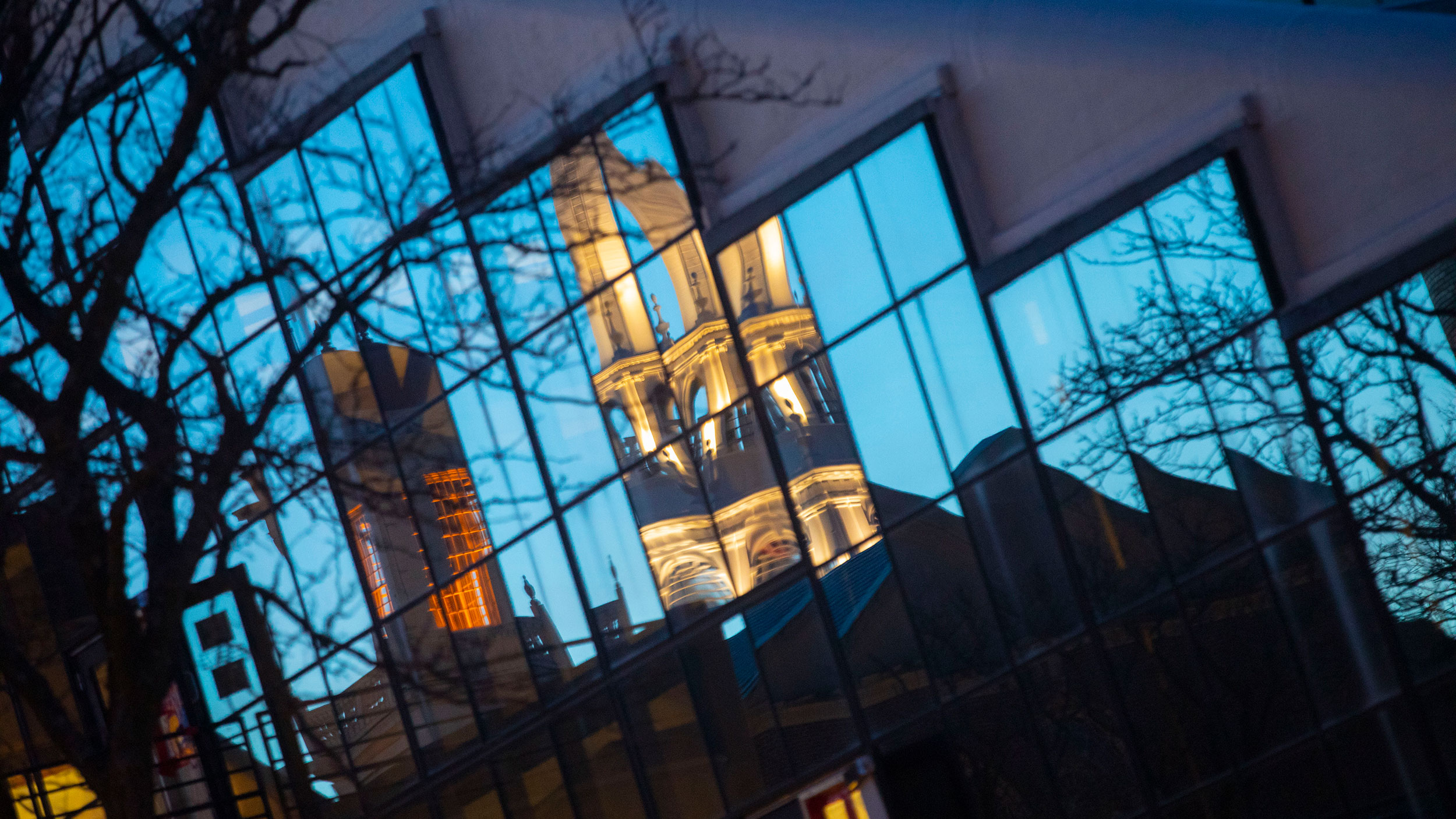
Memorial Church is reflected in the windows of the Graduate School of Design’s Gund Hall.
Kris Snibbe/Harvard Staff Photographer
The University marks its milestones, memorable moments
It felt like the start of a new era.
Life on campus returned to being undeniably, noisily, energetically “in person.” There were still some COVID rules. But masking quickly faded as students went to classes; audiences packed performances and presentations; handshakes replaced Zoom high fives for visiting dignitaries.
It was also a year of innovation in classrooms and labs, breakthroughs in science and medicine, and new initiatives in artificial intelligence and climate change. The community examined its history with slavery and began taking steps to redress our legacies with it. Changes in leadership were announced throughout the University.
Here are some highlights from the 2022-23 academic year.
JUNE
Larry Bacow, Harvard University’s 29th president, announced he would step down at the end of the academic year. He served 12 years as a member of the Harvard Corporation, including five as president.
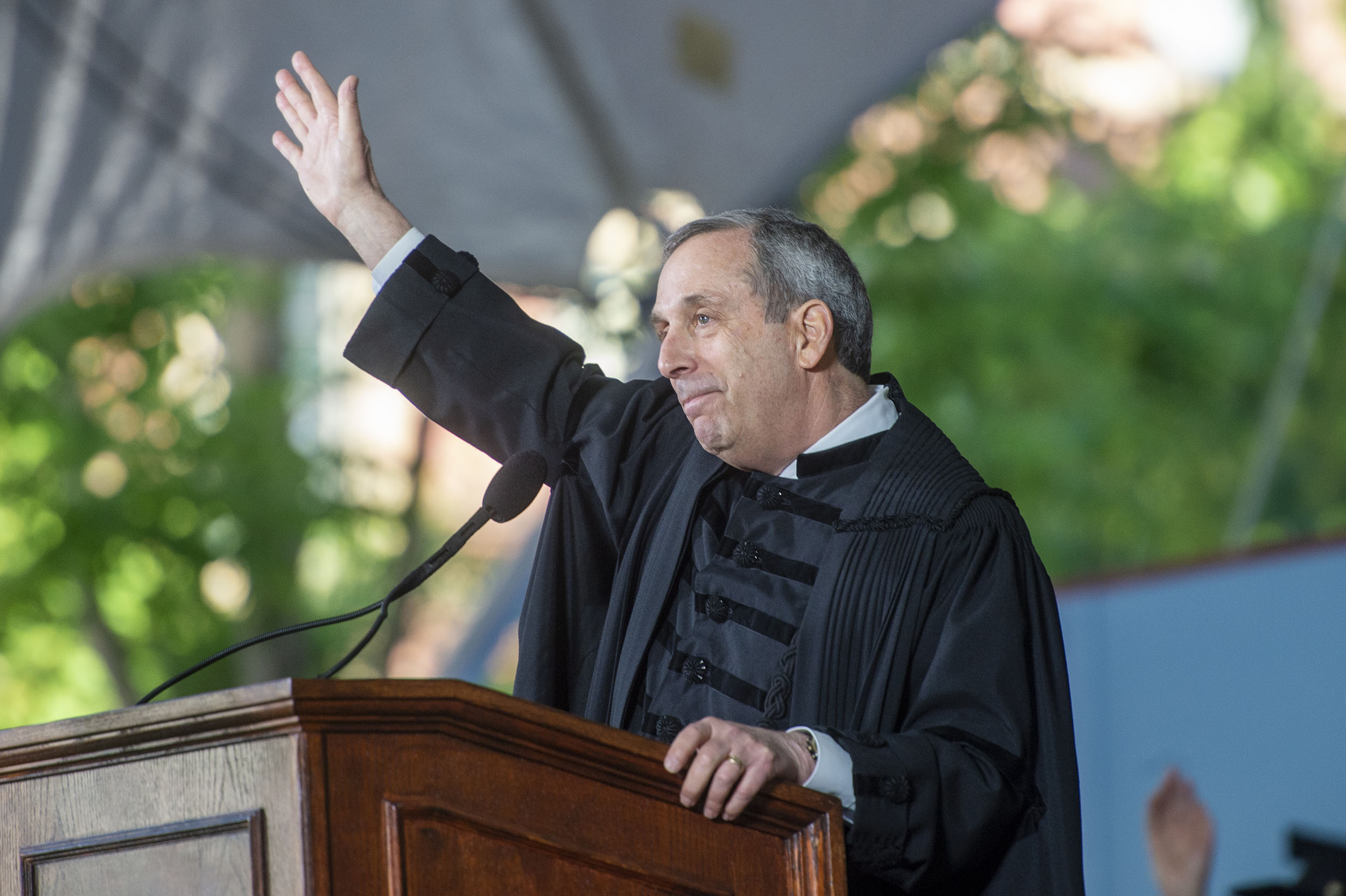
President Larry Bacow. File photo by Jon Chase/Harvard Staff Photographer
Jon Chase/Harvard Staff Photogra
Jean Eric and Melanie Salata gave a generous, $200 million gift to advance and catalyze research programs across all of Harvard’s Schools and enable comprehensive cross-University education in climate and the environment with the creation of the Salata Institute.
Harvard Graduate School of Education welcomed the first cohort of the Teaching and Teacher Leadership (TTL) master’s program to bring together aspiring and experienced educators to learn from, and join in community with, one another and their faculty mentor.
Kelvin Dinkins Jr. began as American Repertory Theater’s executive director.
Nine innovators working across activism, horticulture, real estate development, technology, architecture, visual arts, and other fields that engage with the built environment and social outcomes were named Loeb Fellows and given a one-year residency at the Graduate School of Design.
Thousands of alumni from around the world came together in Tercentenary Theatre to participate in the first-ever Harvard Alumni Day — a University-wide event celebrating their impact and citizenship.
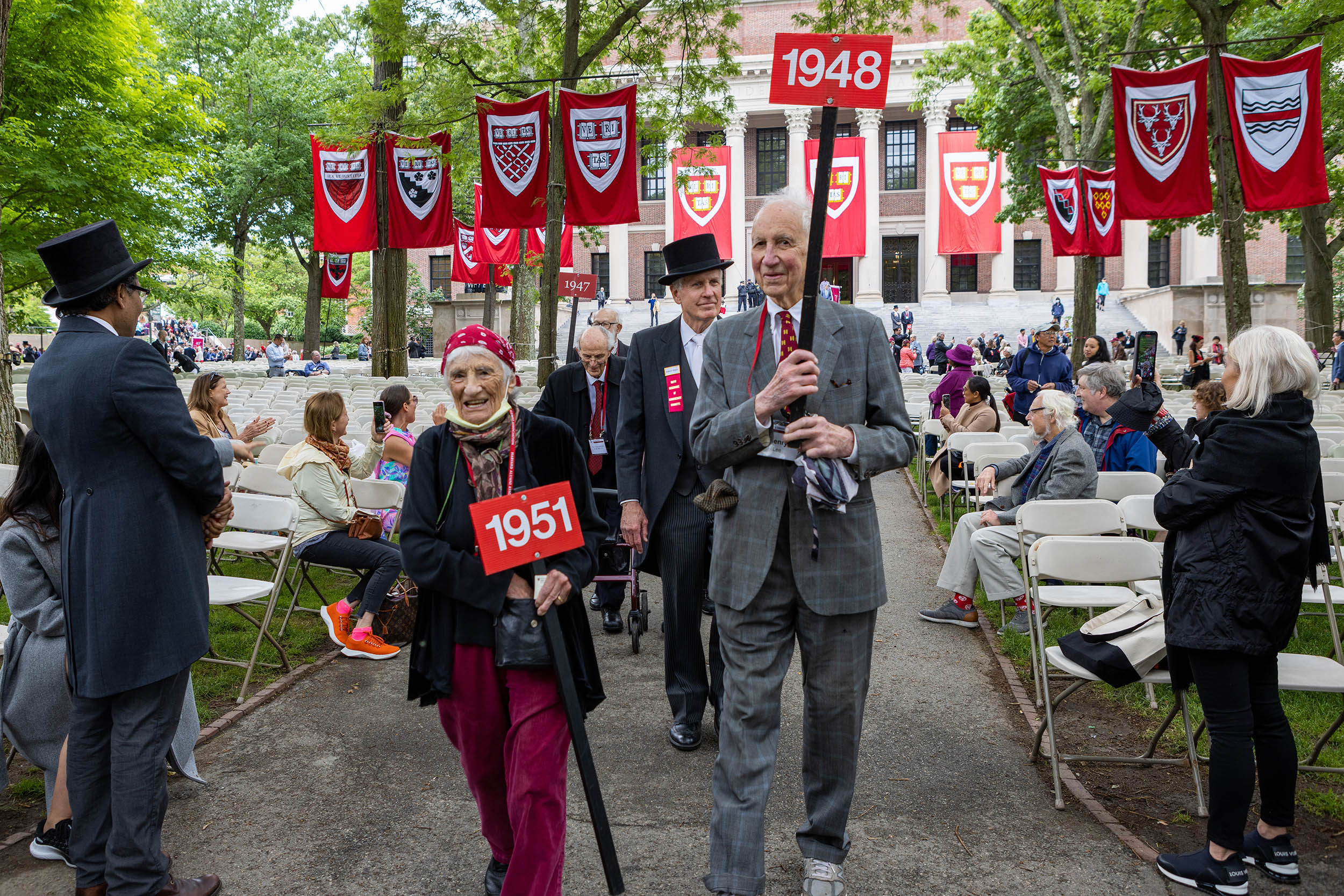
Linda Black ’51 joins Henry Lee ’48 in the Harvard Alumni Day procession.
File photo by Jon Chase/Harvard Staff Photographer
JULY
Following Larry Bacow’s announcement, the Harvard Corporation began the search for the University’s 30th president.
Experts discussed the fallout of the U.S. Supreme Court’s decision to overturn Roe v. Wade at a Harvard T.H. Chan School of Public Health event. They predicted that the effects would fall disproportionately on people of color and poor people, and they recommended a well-coordinated policy response going beyond the realm of reproductive health.
David Ginty was named the new chair of Harvard Medical School’s Neurobiology Department succeeding Michael Greenberg, the Nathan Marsh Pusey Professor of Neurobiology, who announced last November that he would be stepping down after 14 years as chair.
The first phase of Harvard University’s Enterprise Research Campus in Allston received unanimous approval from the Boston Planning and Development Agency (BPDA) board.
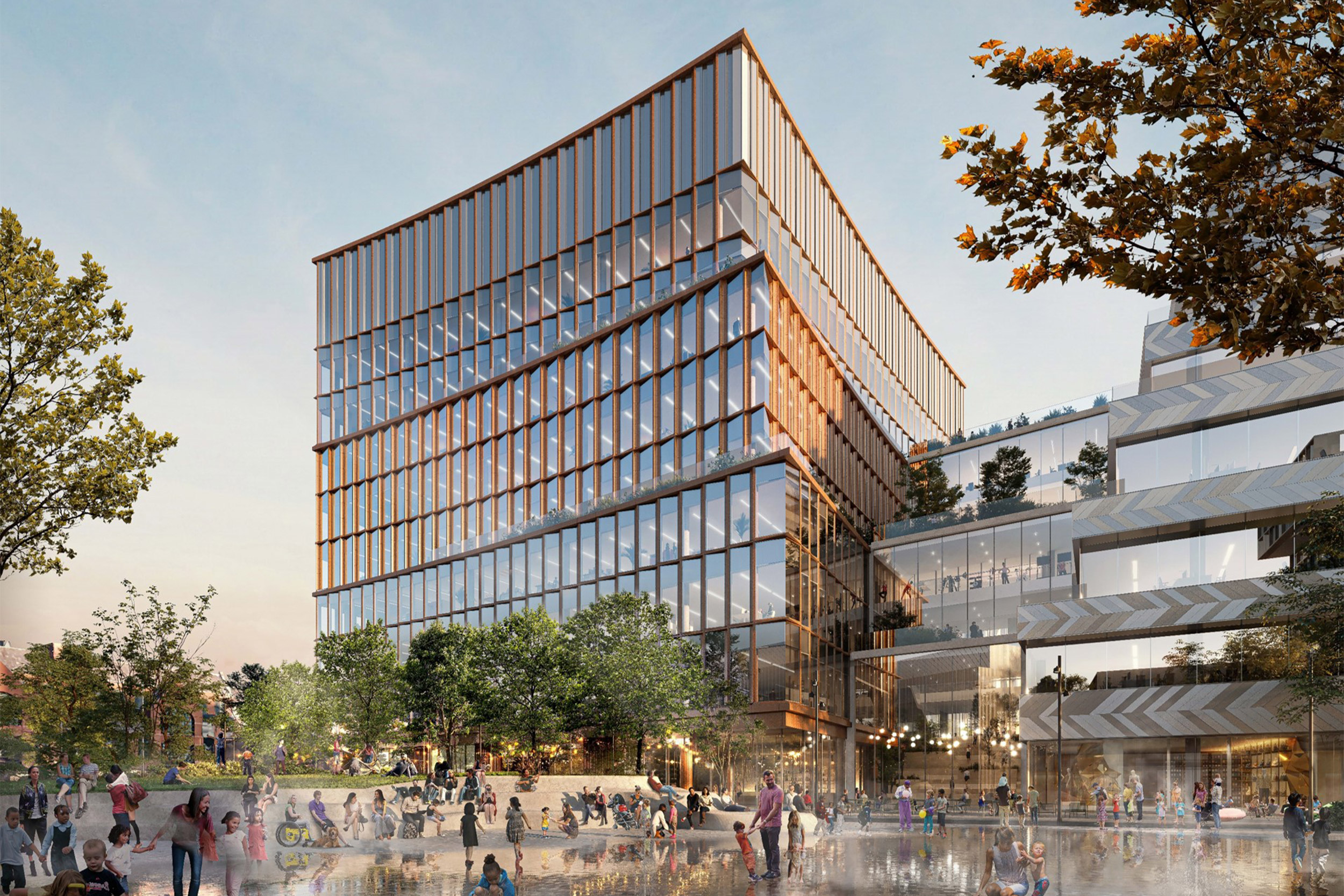
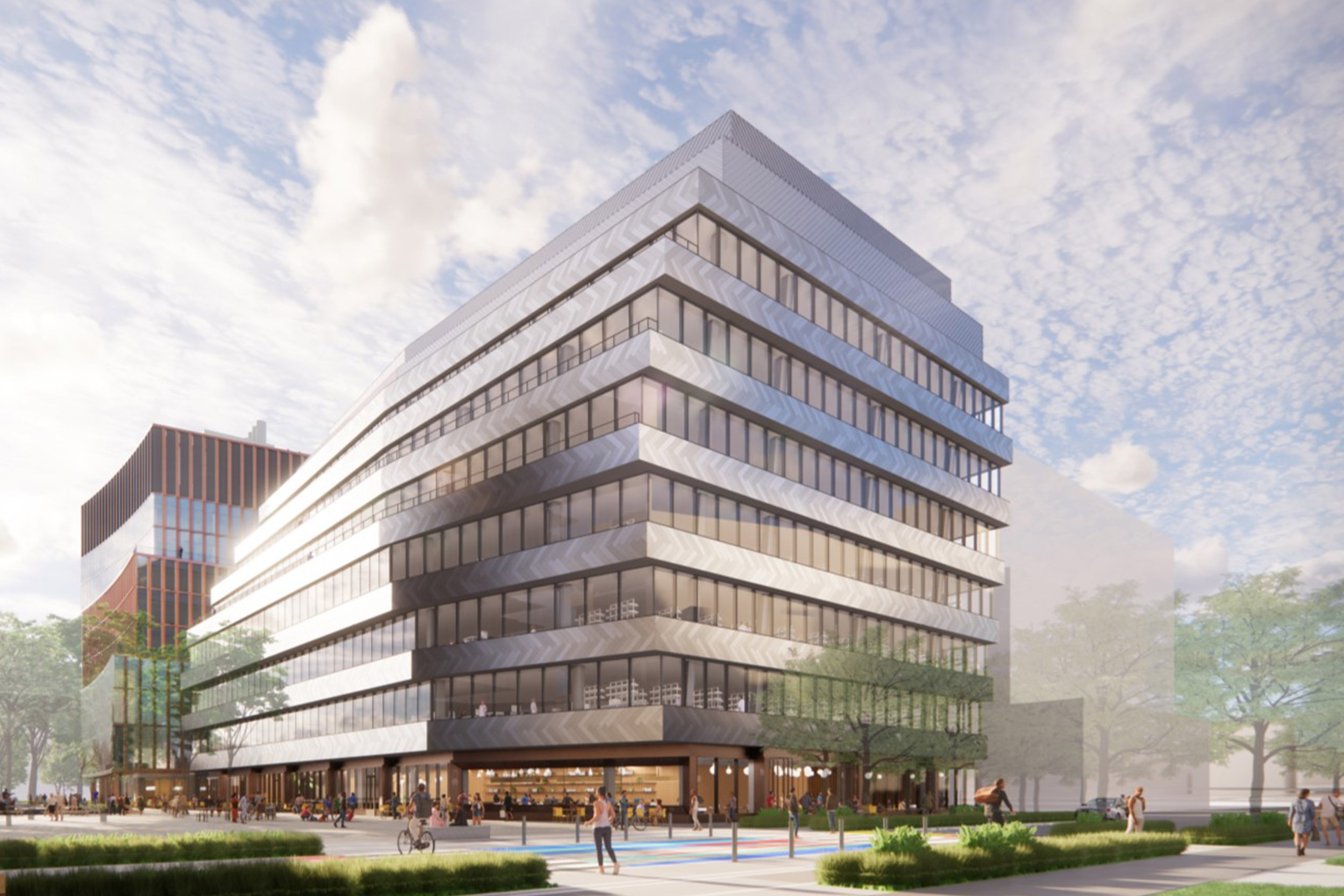
Renderings courtesy of Tishman Speyer
PeopleSoft, one of Harvard’s internal people-management systems, began offering employees a broader set of gender-inclusive options to identify themselves in an effort to create a more inclusive Harvard.
After 28 years on the Supreme Court Justice Stephen Breyer returned to Harvard Law School to teach several seminars and reading groups while participating in intellectual life.
AUGUST
Amid an ongoing Supreme Court battle, a large and broad coalition of major American corporations, higher-education organizations, and legal, religious, military, and civil rights groups voiced their strong support for Harvard and the consideration of race as one factor among many in a whole-person review of an applicant.
Classmates, tutors, proctors, resident deans, students’ families, and top administrators rolled up their sleeves to help first-years move in.
In an effort to make an M.B.A. degree more affordable and accessible to a wider array of students, Harvard Business School announced that it would provide scholarships to cover the total cost of tuition and course fees for those with the greatest financial need — approximately 10 percent of its student body.
The Center for Public Leadership at Harvard Kennedy School appointed five Hauser Leaders from across the public, nonprofit, and private sectors to engage with students, faculty, and the wider Harvard community.
SEPTEMBER
Harvard School of Dental Medicine, in partnership with Bi-State Primary Care Association, Dartmouth-Hitchcock Medical Center, and six other rural care delivery sites, began offering the Advanced Education in General Dentistry (AEGD) – Rural Track to better serve vulnerable and underserved populations.
The Harvard Art Museums named Ayşin Yoltar-Yıldırım as the new Norma Jean Calderwood Curator of Islamic and Later Indian Art.
Mark Zuckerberg and his wife, Priscilla Chan, shared their vision for the Kempner Institute, a “one-of-a-kind institute in the world for studying intelligence.”
Photo by John Deputy
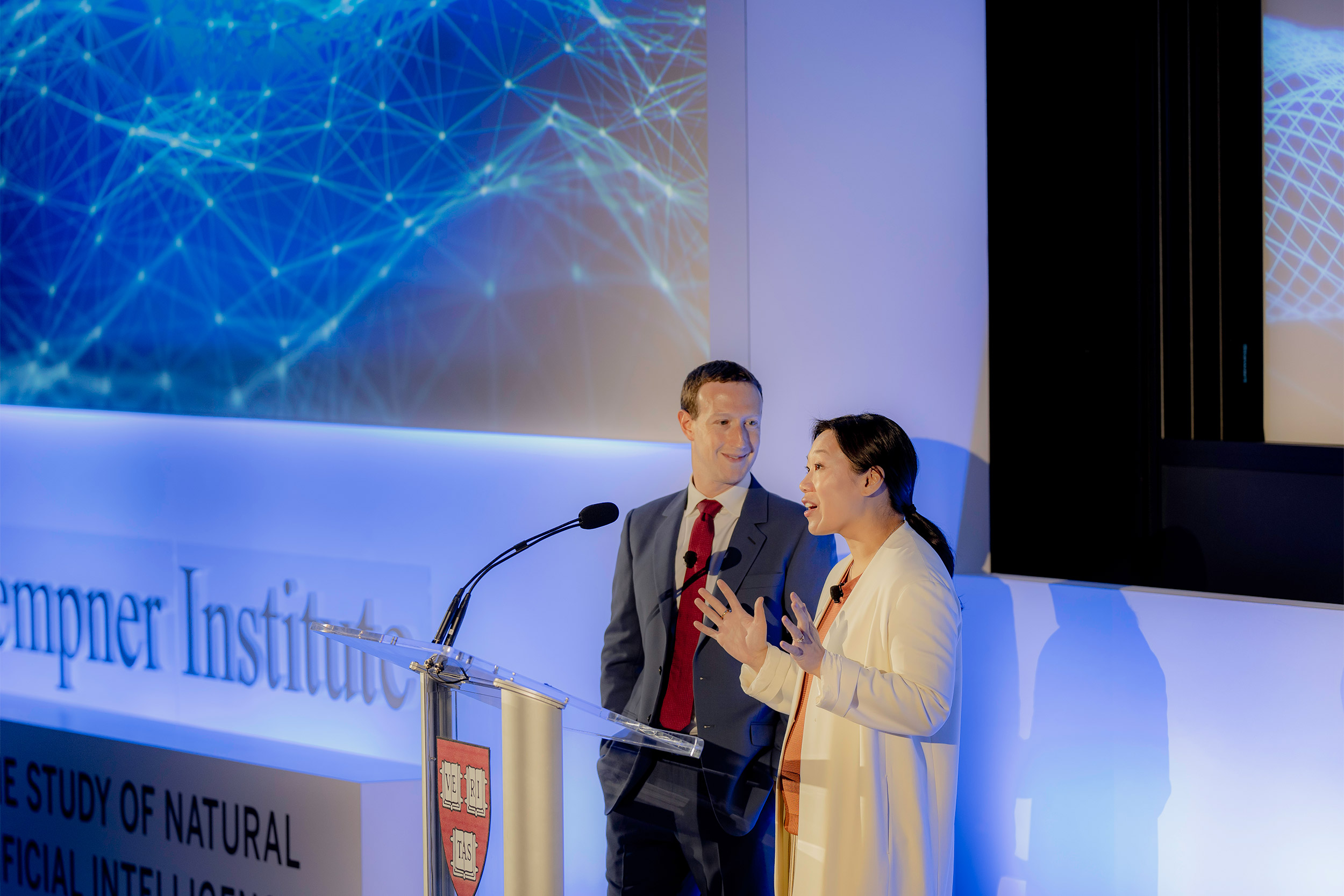
The new Kempner Institute for the Study of Natural and Artificial Intelligence, made possible with a gift from Mark Zuckerberg ’06, LL.D. ’17, and his wife, Priscilla Chan ’07, kicked off with a daylong program in Allston.
After a three-year pandemic hiatus, the Hutchins Center for African and African American Research celebrated the first slate of W.E.B Du Bois Medal recipients “who embody the values of commitment and resolve that are fundamental to the Black experience in America.”
Harvard Griffin Graduate School of Arts and Sciences marked an extraordinary milestone — 150 years as a graduate school.
The Harvard-Radcliffe Women’s Rugby Football Club, founded in 1982 by Ingrid Jacobsen ’83, coach Mindy Fener, and faculty adviser Paul Erikson, toasted 40 years of existence.
OCTOBER
Harvard mathematician Melanie Matchett Wood was named a MacArthur Fellow. “It was a big shock. Only a handful of mathematicians ever get this,” she said. “It was certainly not something on my radar.”
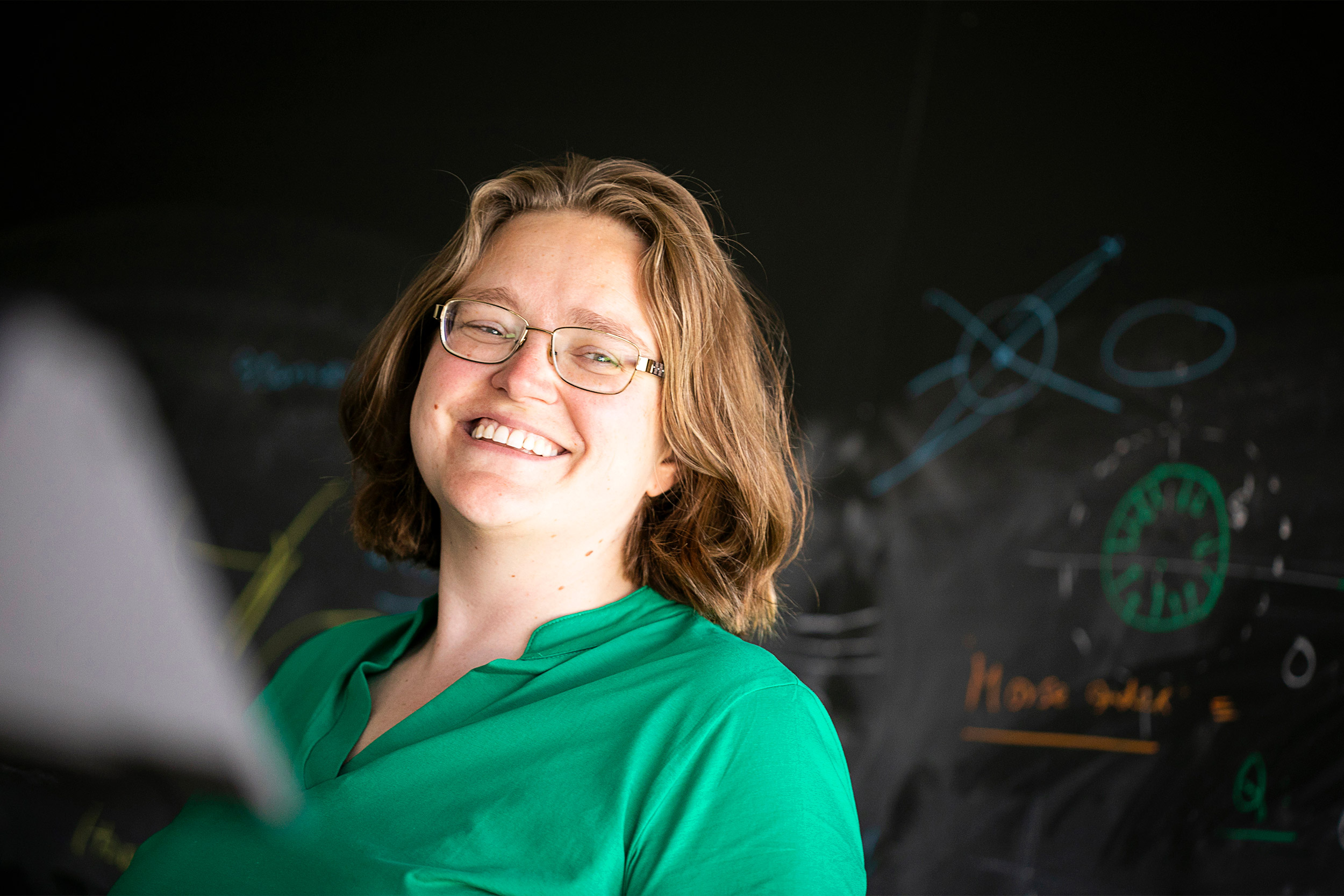
Harvard Professor Melanie Matchett Wood.
Stephanie Mitchell/Harvard Staff Photographer
Entrepreneur and philanthropist Hansjörg Wyss, M.B.A. ’65, continued to support the mission of the Wyss Institute for Biologically Inspired Engineering at Harvard University with a $350 million gift.
A $25 million CDC grant awarded to the Massachusetts Department of Public Health established the New England Pathogen Genomics Center of Excellence to be led by Harvard Medical School and the Massachusetts Consortium on Pathogen Readiness. The new center will help better understand novel pathogens like the coronavirus.
Harvard Divinity School celebrated the 10th anniversary of the Buddhist Ministry Initiative, which trains future Buddhist religious professionals in ways appropriate to modern, global conditions. In its 10 years of existence, the program has brought more than 20 international fellows to HDS and hosted multiple conferences, including a series on Buddhism and race.
Ash Carter, Harvard Kennedy School professor and former U.S. defense secretary, died.
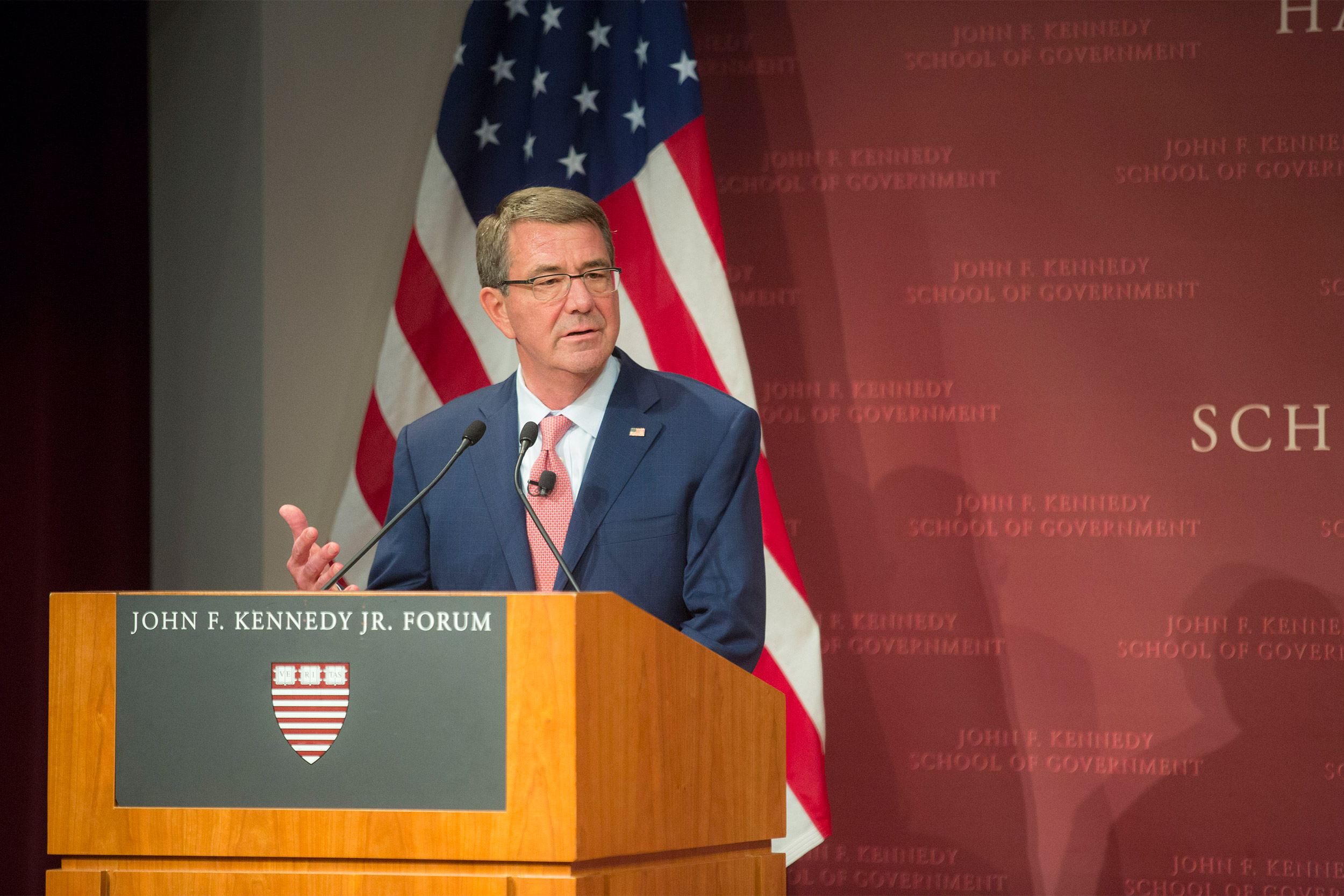
Ash Carter at Harvard Kennedy School. File photo by Kris Snibbe/Harvard Staff Photographer
Harvard University
The University appointed Richard Cellini, the scholar who founded the Georgetown project, to lead Harvard’s Legacy of Slavery remembrance program.
More than 100 Harvard students went to Washington, D.C., to attend a rally in support of campus diversity on the steps of the Supreme Court.
NOVEMBER
Six Harvard College seniors were selected to study at the University of Oxford next year as American Rhodes Scholars. The six were among 32 U.S. students named recipients of the prestigious scholarship.
Sara N. Bleich, a professor of public health policy at the Harvard T.H. Chan School, renowned expert on nutrition security, and advocate for health equity, was named the University’s inaugural vice provost for special projects.
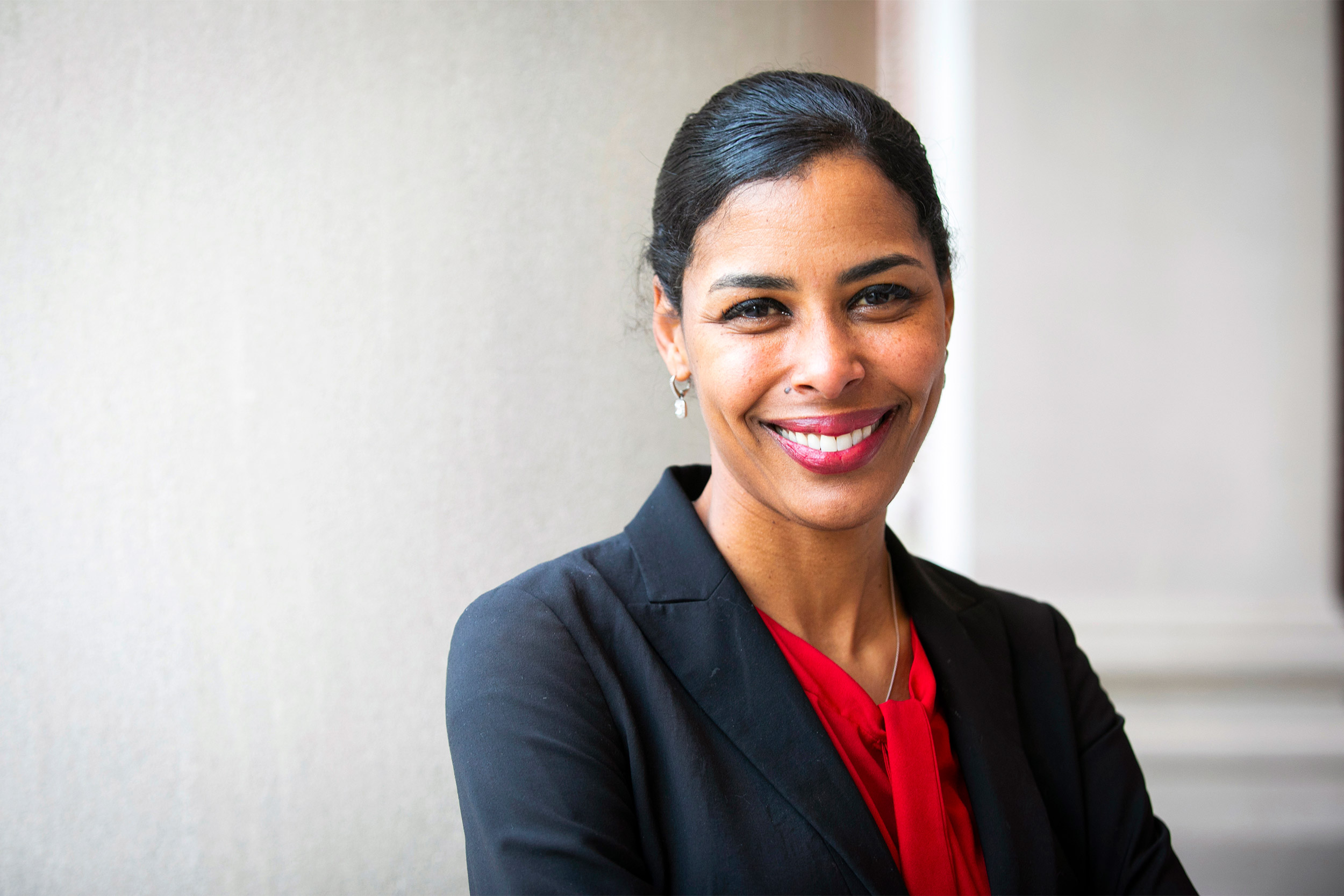
Sara N. Bleich assumed her new position in January 2023.
Stephanie Mitchell/Harvard Staff Photographer
Thomas J. Hollister, Harvard’s chief financial officer and vice president for finance, announced he would step down and retire at the end of the academic year.
Harvard School of Dental Medicine and The Forsyth Institute in Cambridge announced joint pilot grants to fund promising collaborative research studies leading to future external funding.
Harvard Business Review commemorated its 100th anniversary.
The Harvard Crimson faced off against the Yale Bulldogs at the historic Harvard Stadium. Thousands came out in support.
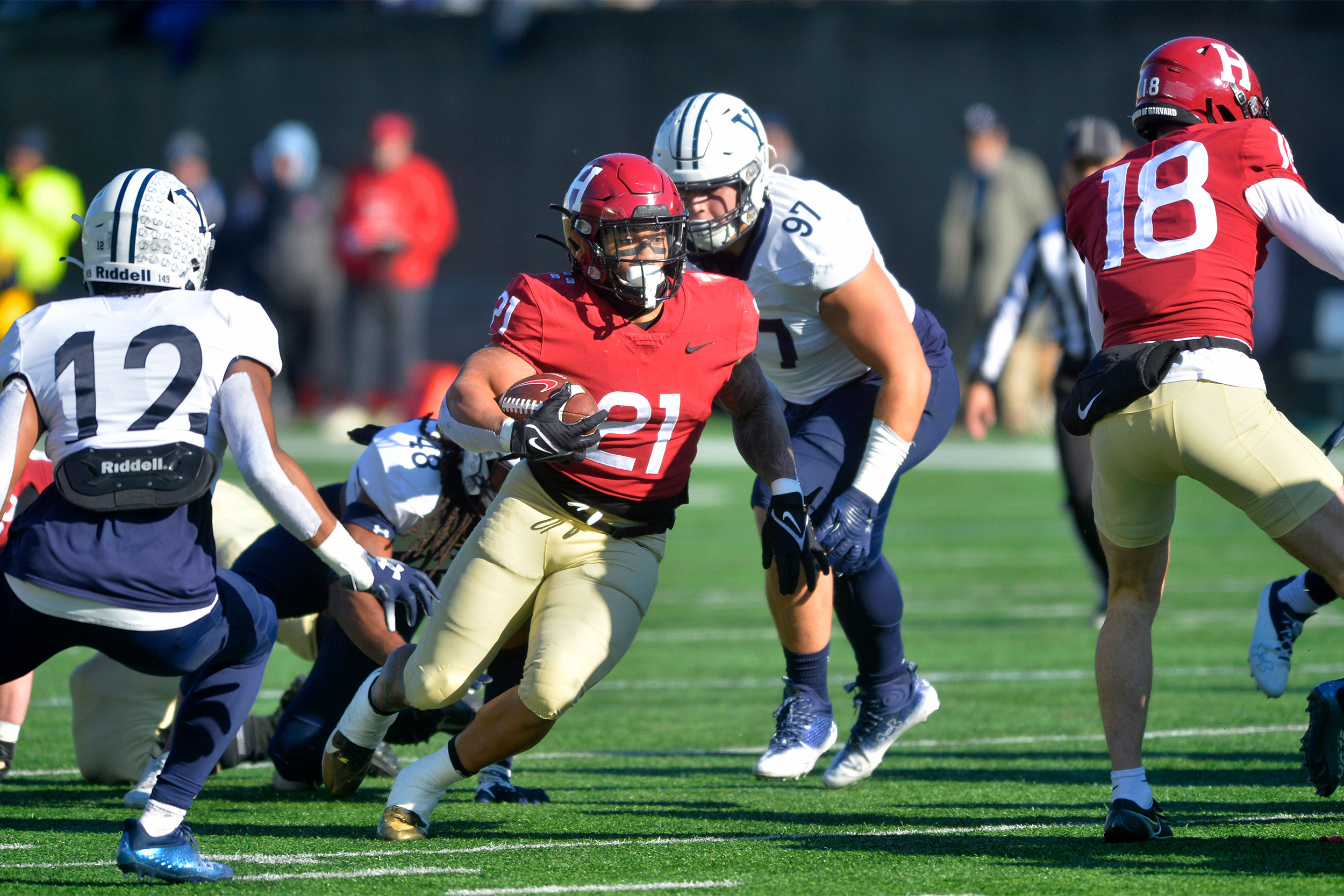
Harvard-Yale football game at Harvard Stadium, Nov. 19. Yale won, 19-14.
Jon Chase/Harvard Staff Photographer
Henry Rosovsky, a leading economist and innovative administrator who twice served as dean of the Faculty of Arts and Sciences and acting president of the University, died Nov. 11 at his home in Cambridge, Massachusetts. He was 95.
DECEMBER
Claudine Gay was named the 30th president of Harvard University. Since 2018, Gay has served as the Edgerley Family Dean of Harvard’s Faculty of Arts and Sciences.
Catherine, the Princess of Wales, stopped at Harvard’s Center on the Developing Child as part of a visit to the Boston area with her husband, William, the Prince of Wales.
In a series of experiments, scientists at Harvard-affiliated Beth Israel Deaconess Medical found that patients with severe COVID-19 exhibit a drop in cognitive performance that mimics accelerated aging.
Three Harvard seniors will be heading to England and Ireland in the fall after being awarded International Rhodes and Mitchell scholarships.
Sarah C. Karmon was named executive director of the Harvard Alumni Association and an associate vice president of alumni affairs and development.
Gazette photographers were excited to finally get out from behind those little Zoom squares and capture the people, places, and traditions that define Harvard. Here are some of their favorite shots.
JANUARY
On the 50th anniversary of the historic Roe v. Wade decision, Harvard Radcliffe Institute held “The Age of Roe,” a two-day conference that explored the complex and unpredictable ways Roe v. Wade had shaped the U.S.
Harvard Medical School’s Educational Policy and Curriculum Committee voted unanimously to add climate change and health as one of the priority societal themes of the M.D. curriculum.
To honor the legacy of Paul Farmer, the Cummings Foundation committed $50 million to establish the Paul Farmer Collaborative of Harvard Medical School and the University of Global Health Equity in Rwanda.
Hasty Pudding Theatricals honored Bob Odenkirk as Man of the Year and Jennifer Coolidge as Woman of the Year. The actors received their pudding pots in separate roasts at Farkas Hall.

Parade for Hasty Pudding 2023 Woman of the Year Jennifer Coolidge.
Jon Chase/Harvard Staff Photographer
Harvard T.H. Chan School of Public Health’s gun violence researchers received their largest-ever grant — $5 million from the Robert Wood Johnson Foundation — to advance research on gun violence prevention in the U.S.
Harvard researchers reported that they’d turned the clock back on laboratory mice by altering molecules that turn DNA on and off, resetting cellular aging.
Harvard Divinity School hosted “Religion and the Legacies of Slavery,” online public conversations that expanded the public understanding of the complex history and continuing implications of slavery in service of advancing racial justice.
A Harvard-led team of researchers showed that ExxonMobil modeled and predicted global warming with “shocking skill and accuracy” starting in the 1970s.
Shaye J.D. Cohen, the Nathan Littauer Professor of Hebrew Literature and Philosophy in the Department of Near Eastern Languages and Civilizations, completed a decadelong project, a new translation of the Mishnah, to make it “accessible to people for whom it was otherwise inaccessible.”
ArtsThursdays kicked off, featuring a free showcase of Harvard’s vibrant arts scene, from dance and theatrical performances to artist talks and exhibit openings. All events were sponsored by the Harvard University Committee on the Arts.
FEBRUARY
Swiss biotech executive, entrepreneur, and philanthropist Ernesto Bertarelli pledged $75 million to transform an outdoor courtyard into a skylighted atrium that will serve as convening and collaboration space at Harvard Medical School.
Meghan L. O’Sullivan, a Harvard Kennedy School professor and former senior national security official, was appointed the director of the School’s Belfer Center for Science and International Affairs.
Ruth Simmons, a nationally recognized leader in higher education and president emerita of Smith College and Brown University, was named to serve as a senior adviser to the president of Harvard University on engagement with Historically Black Colleges and Universities.
Remembering James R. “Jamie” R. Houghton, a former member of the Harvard Corporation who had deep Harvard roots, died at age 86.
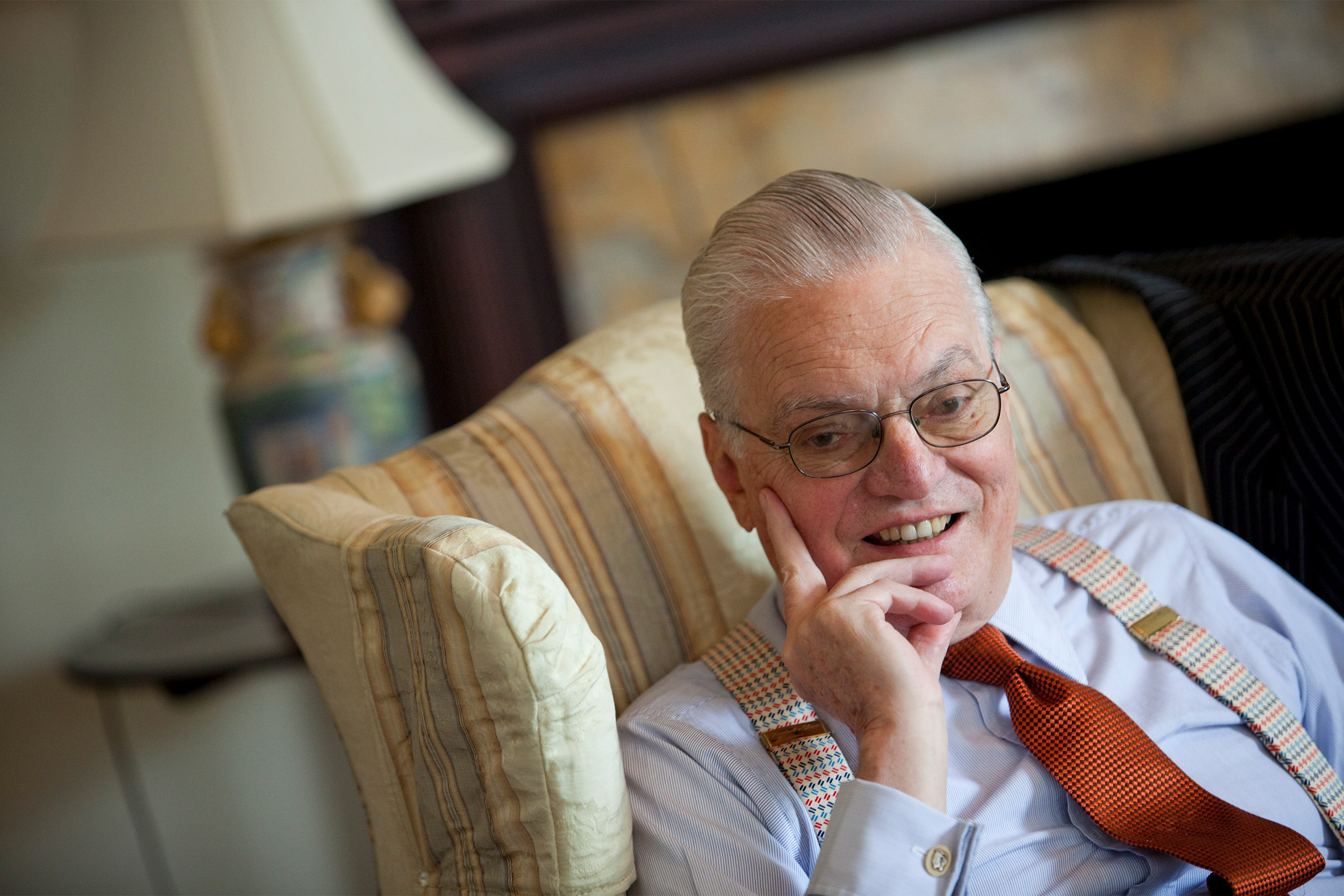
James R. Houghton. Harvard file photo
Harvard University News Office
Steven Pinker weighed in on whether ChatGPT will replace human writers.
The University announced the Harvard & the Legacy of Slavery Memorial Project committee members. The committee will lead an effort to memorialize enslaved individuals whose labor was instrumental in the establishment and development of Harvard.
Harvard-affiliated Massachusetts General Hospital identified eight key social factors that affect an individual’s future health.
Brenda Tindal named the first chief campus curator for Harvard’s Faculty of Arts and Sciences.
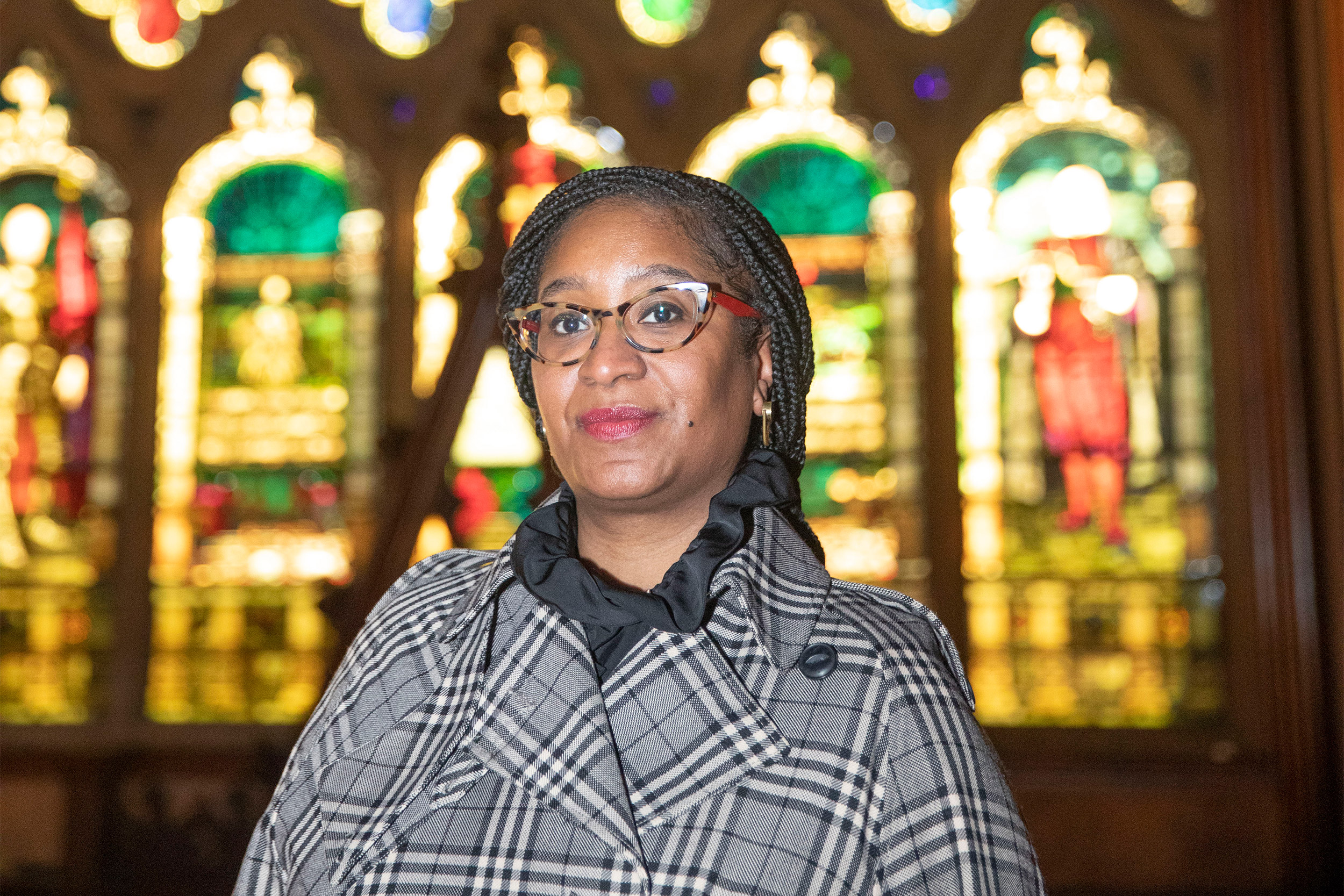
Brenda Tindal.
Kris Snibbe/Harvard Staff Photographer
MARCH
Actor, writer, filmmaker, and humanitarian Tom Hanks was named principal speaker at Harvard’s 372nd Commencement.
Researchers at the Wyss Institute for Biologically Inspired Engineering and the Harvard John A. Paulson School of Engineering and Applied Sciences found the key to healing muscle injuries in the elderly.
On March 10, GSAS Dean Emma Dench announced the appointment of Bill Stackman as the School’s next dean of students
Harvard Medical School neurobiologist Michael Greenberg won The Brain Prize 2023 for his lifelong research into brain plasticity: the ability of the organ to change, adapt, and learn over time.
Renowned novelist Zadie Smith’s contemporary reimagining of “Wife of Bath’s Tale” opened at the American Repertory Theater.
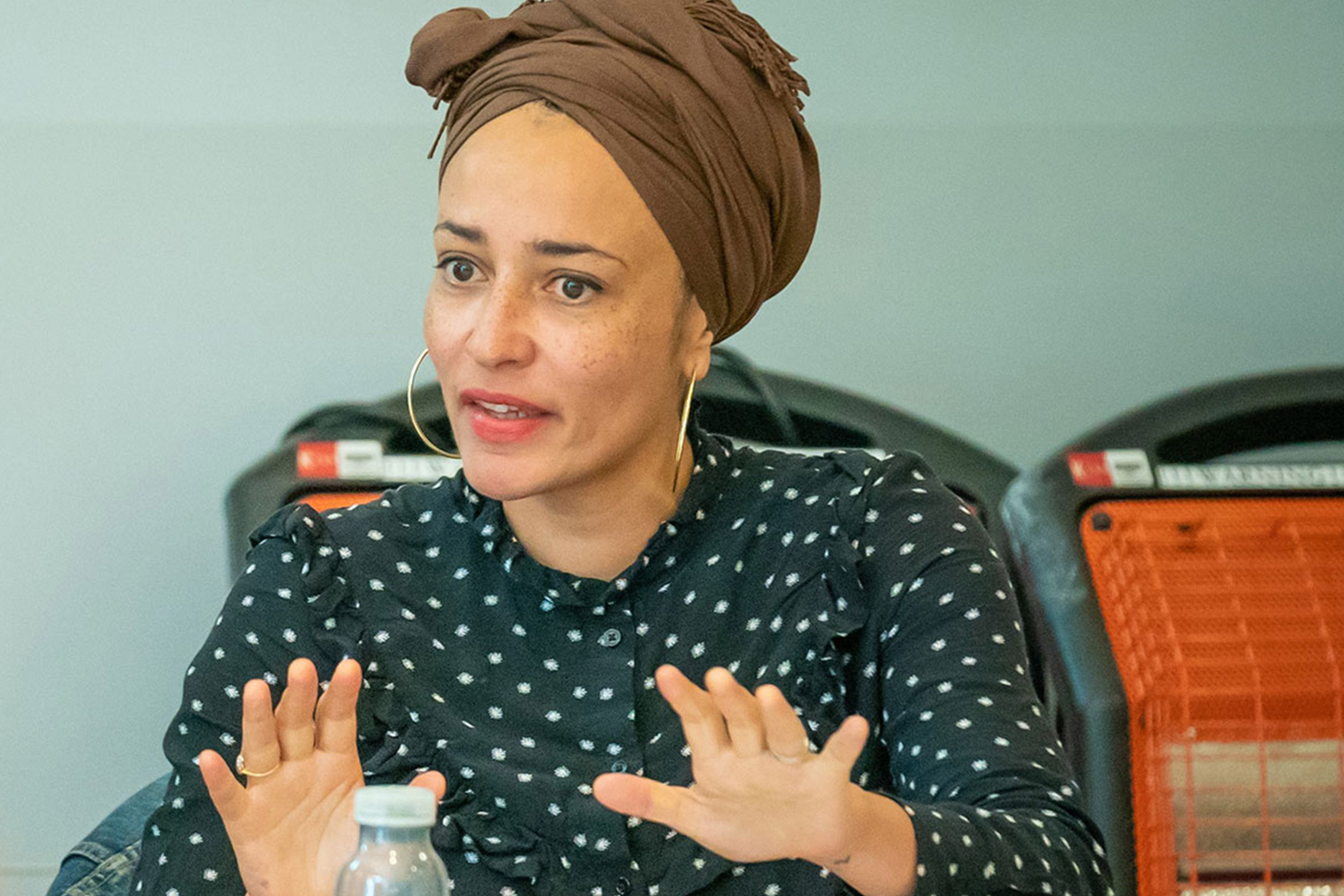
Zadie Smith at the A.R.T.
Photo by Marc Brenner
Harvard College offered regular admission to 1,220 applicants for the Class of 2027, with 1,942 admitted in total.
The Harvard Art Museums’ installation “Bosco Sodi: Origen” is the first presentation of art on the museums’ outdoor terrace.
APRIL
In recognition of Kenneth C. Griffin’s commitment to the University’s mission, Harvard announced that GSAS will be renamed the Harvard Kenneth C. Griffin Graduate School of Arts and Sciences.
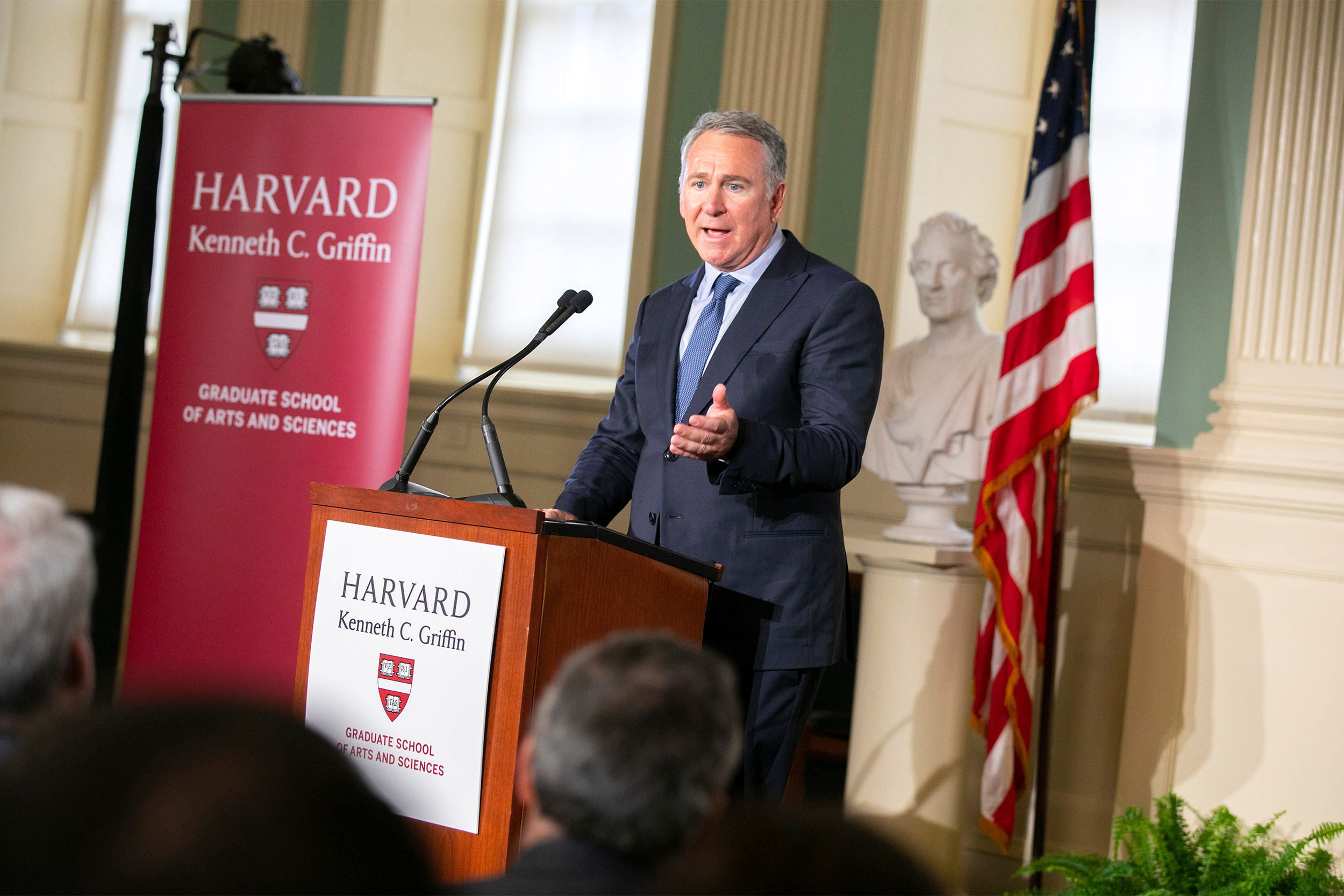
Business leader and philanthropist Kenneth C. Griffin ’89 at University Hall. Stephanie Mitchell/Harvard Staff Photographer
Harvard University
The Thich Nhat Hanh Center for Mindfulness in Public Health launched at Harvard T.H. Chan School of Public Health. It was created with a $25 million gift from an anonymous donor, one of the largest single donations to the School.
A research team led by Harvard Medical School’s Zheng-Yi Chen reported creating a drug-like cocktail of different molecules that successfully regenerated hair cells that enable hearing in a mouse model.
The Harvard Kennedy School Project on Indigenous Governance and Development received $15 million in gifts to expand research, sharing innovation and best practices.
The opening of the Bloomberg Center for Cities at Harvard University marked the first of its kind in uniting cities-focused expertise and providing opportunities for cross-Harvard collaboration.
DNA showed that the poorly understood empire of the nomadic Xiongnu was multiethnic, featuring strong female leadership.
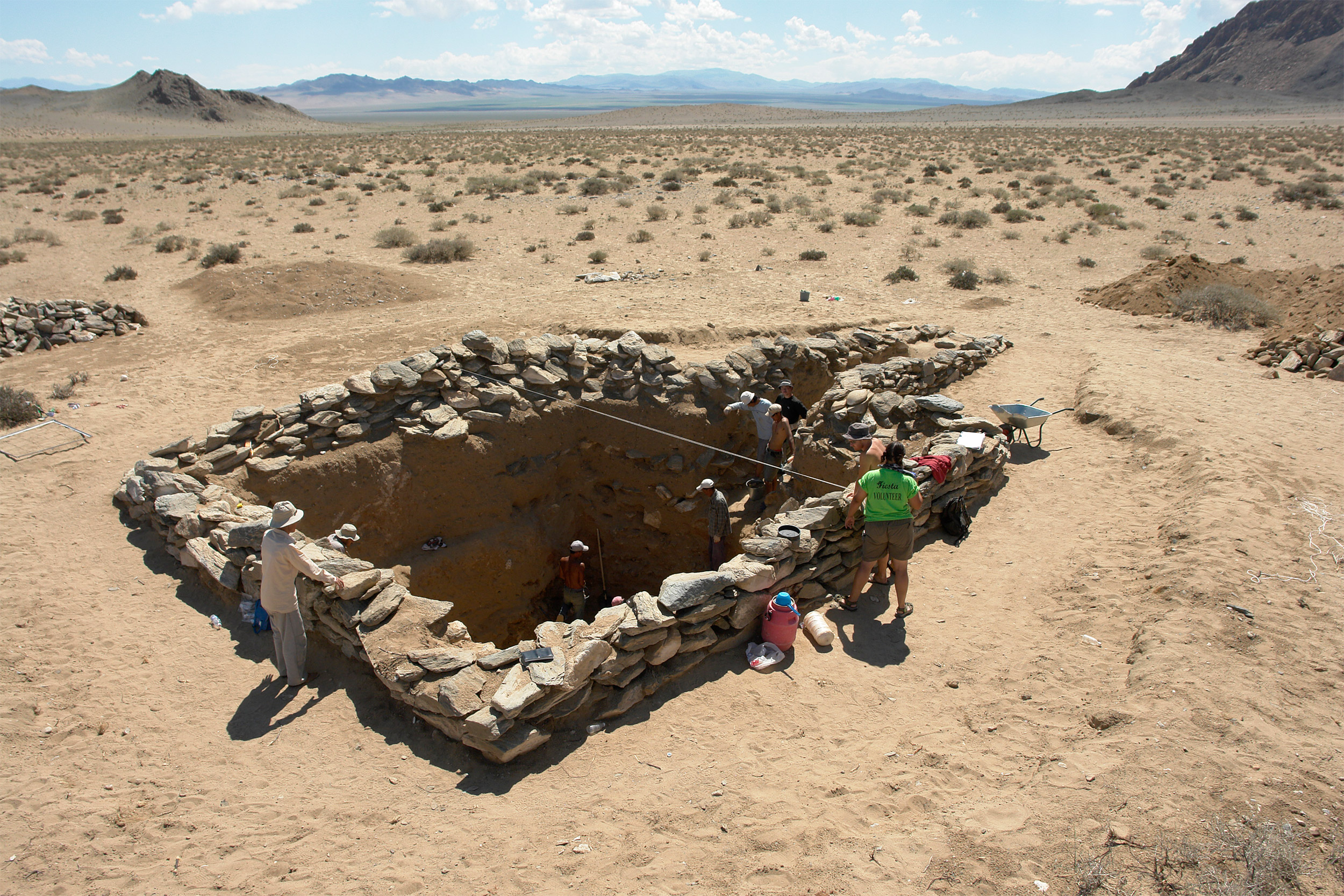
The Xiongnu left vast mortuary complexes, elaborately built from stone and visible from miles away.
Courtesy of Christina Warinner
The Harvard Alumni Association has announced that Paula A. Johnson ’80, M.D. ’84, M.P.H. ’85; Philip W. Lovejoy; Antonio Madero, M.B.A. ’61; and Rya W. Zobel ’53, L.L.B. ’56, will receive the 2023 Harvard Medal.
Meredith “Max” Hodges (left) was named president of the Harvard University Board of Overseers. Geraldine Acuña-Sunshine will serve as vice chair.
The Presidents-in-Residence program at the Harvard Graduate School of Education was fully endowed and renamed in honor of its founder, senior lecturer Judith Block McLaughlin.
Harvard Divinity School students, faculty, and staff organized the first-ever Climate Justice Week, an initiative to honor Earth Month by proactively tackling the urgency of the climate crisis.
Swartz Hall, Harvard Divinity School’s recently renovated main campus building, was awarded LEED Platinum certification, the highest level designated by the U.S. Green Building Council for healthier buildings.
MAY
Astronomers observed for the first time a star consuming a planet, bolstering the theory Earth will meet the same fate — in about 5 billion years.
For the first time, molecules dating to the Stone Age were revived in the lab after scientists achieved another first — they successfully reconstructed the genomes of ancient microorganisms up to 100,000 years old.
Five faculty members were awarded a Harvard College Professorship for excellence in undergraduate teaching, in fields ranging from biophysics to cultural studies.
Graduating Ph.D. student Jinyoung Seo’s project, “Reinventing Air Conditioning with Chemistry,” used solid refrigerants to eliminate direct greenhouse gas emissions while making cooling systems smaller and more efficient.
More than 100 community members gathered at Harvard Divinity School to reflect on a year-long journey with The Legacy of Slavery at Harvard Report.
— Compiled by Terry Murphy and Anna Lamb




